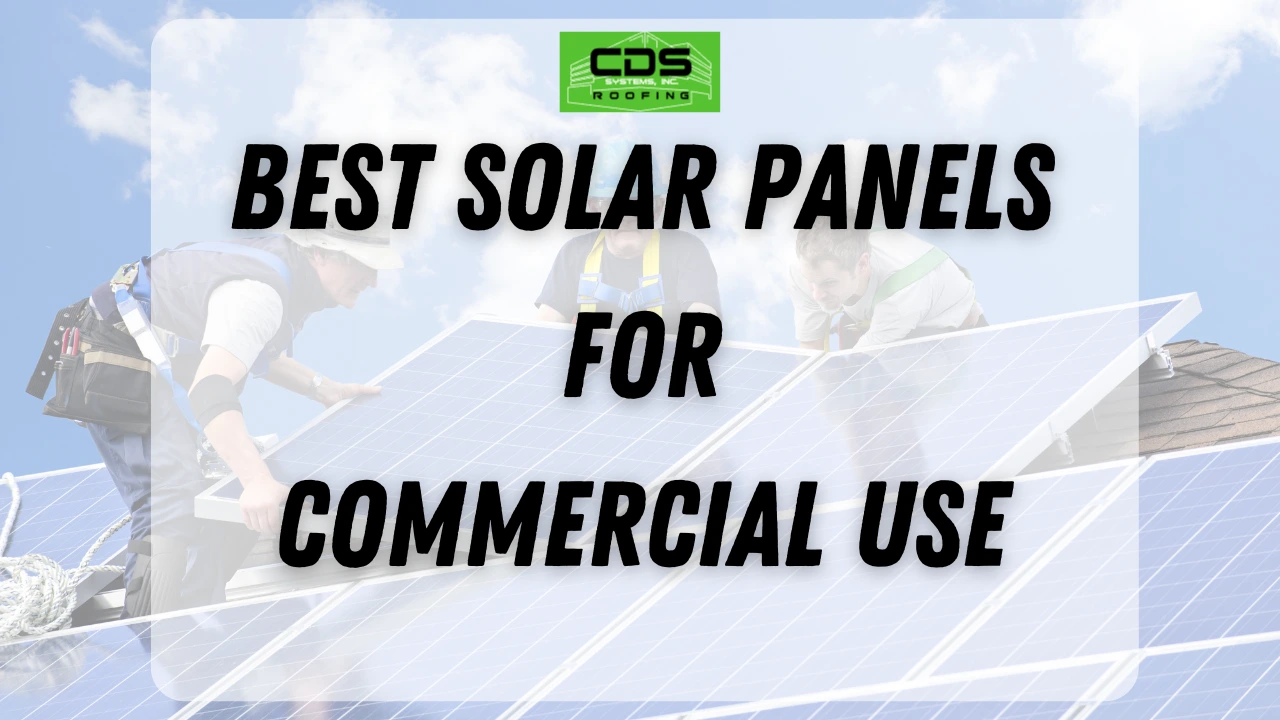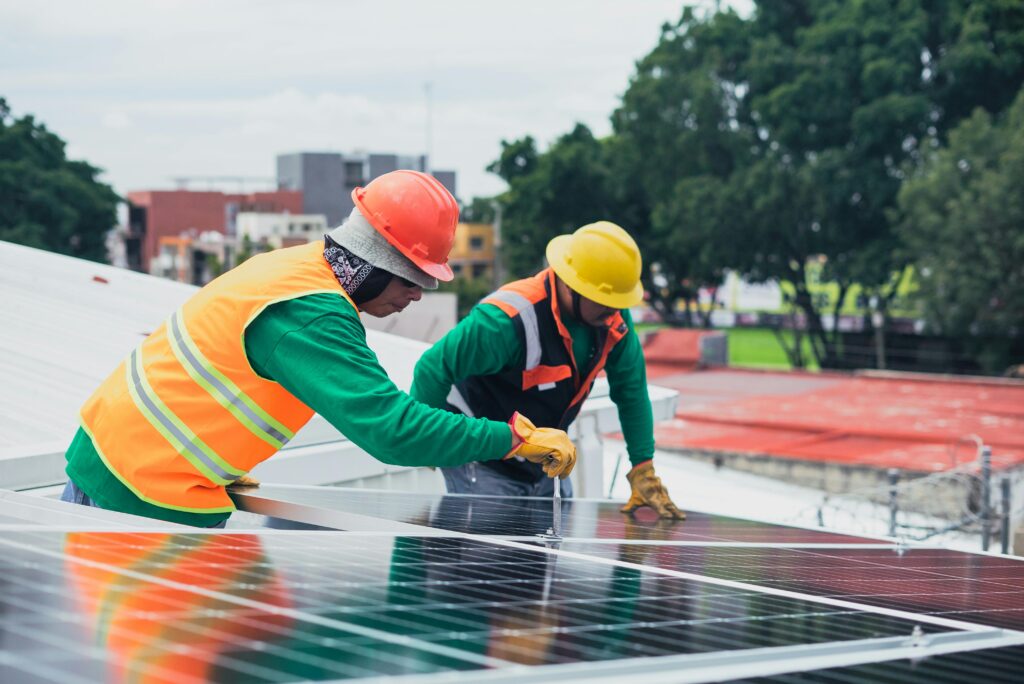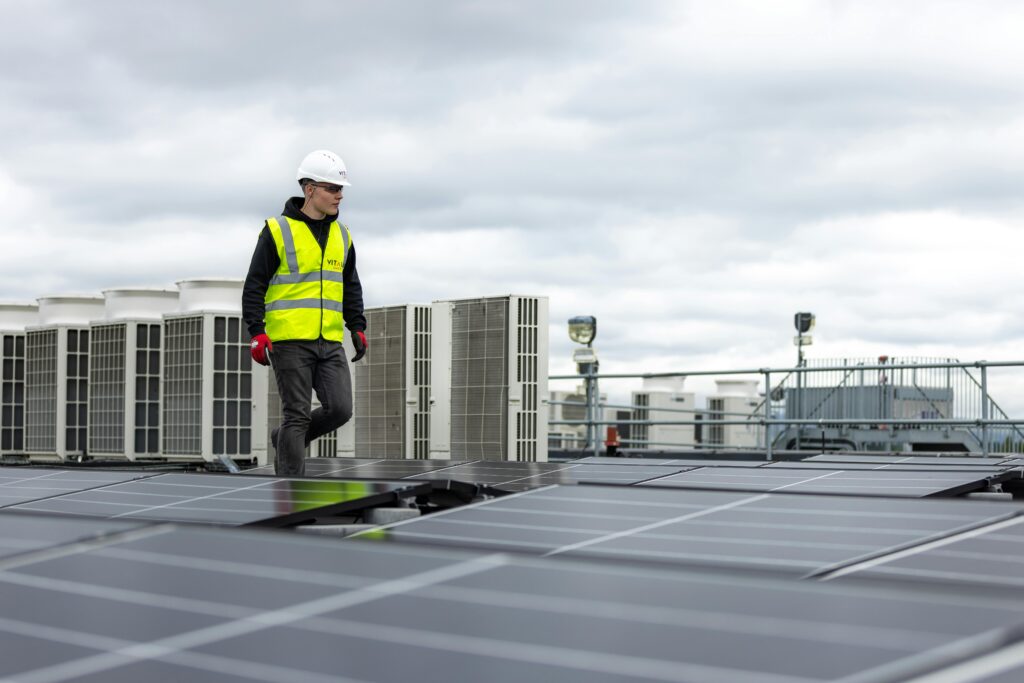When choosing commercial solar panels for your business, you have a lot to consider. After all, solar panels are more than just energy providers–they’re silent partners helping companies cut costs and boost sustainability.
But how do you decide which solar panels are right for your business? There are different types of commercial solar panels, so it’s important to understand all your options before making this investment.
Here, we review the top three solar panels businesses commonly choose today and their features and benefits.
Understanding Solar Panels for Commercial Use and How a Commercial Solar Installer Can Help
Solar panels are an eco-friendly way to meet your business’s energy needs. They convert solar energy into electrical power, making them a practical choice for commercial properties that use a significant amount of energy.
Different types of solar panels suit different business goals and budgets. An experienced commercial solar installer can help you choose the right kind by gauging your company’s energy needs and a solar panel’s power output and efficiency to determine how well it would work for your business.
The Importance of Efficiency in Solar Panels
Put simply, the higher a panel’s efficiency, the more daylight it can transform into electrical energy. High power output and total panel efficiency are closely related, and both play important roles in determining a panel’s maximum power rating and total efficiency.
A high power output means fewer panels are needed to meet your energy requirements. This makes investing in higher-efficiency models an attractive option for businesses despite their typically higher initial costs.
The Top 3 Solar Panels for Commercial Use
So what are the best solar panels for commercial buildings? Here are the top three you should know about.
- Monocrystalline Panels
Monocrystalline solar panels are an excellent choice for commercial properties and are one of the most popular panels available today.
These solar panels are known for their higher efficiency compared to other types of solar panels. Their unique manufacturing process ensures that each cell is made from a single, high-grade crystal structure.
The structure of these panels allows for higher conversion rates, meaning they generate more electricity from the same amount of sunlight. So monocrystalline panels still perform well in low light, making them reliable and efficient even in cloudy or partially shaded environments.
Commercial properties often have limited rooftop space, making space efficiency crucial. Since monocrystalline solar panels have a higher power output per square foot compared to other types of solar panels, businesses can generate more electricity from a smaller area, making them ideal for installations where space is a limiting factor.
Monocrystalline solar panels are also known for their durability. They typically have a longer lifespan than other types of solar panels, ensuring reliable energy production for many years.
- Polycrystalline Panels
Unlike monocrystalline solar panels, polycrystalline panels are made up of multiple cells, which reduces their efficiency but increases their affordability, making them a worthy consideration for commercial properties.
Polycrystalline panels can be the right choice for your business, depending on your specific energy needs and budget. These solar panels can be beneficial for commercial use because of their:
- Cost-effectiveness. Polycrystalline solar panels tend to be more cost-effective compared to monocrystalline solar panels. They are manufactured using a simpler and less expensive process, resulting in lower production costs. This makes polycrystalline panels suitable for commercial properties where cost-efficiency is a significant factor.
- High performance. While polycrystalline solar panels have slightly lower efficiency than monocrystalline panels, modern advancements have reduced this gap significantly. Polycrystalline panels can still offer impressive performance and generate ample electricity, especially in areas with substantial sunlight.
- Adaptability. Polycrystalline panels have slightly lower temperature coefficients, meaning they perform better in high-temperature conditions than some other panel types. This characteristic makes them suitable for commercial properties in hot climates or regions with elevated temperatures.
- Durability. While not quite as durable as monocrystalline, polycrystalline solar panels are still durable and reliable. They can withstand harsh weather conditions, including rain, snow, and hail. This durability ensures minimal maintenance requirements and a long product lifespan, providing a reliable energy source for commercial properties.
- Thin-Film Cells
Thin-film solar cells have a lower efficiency than crystalline silicon (monocrystalline or polycrystalline) solar panels, so more panels may be required to generate the same amount of electricity.
This might not pose a significant limitation for commercial properties with ample roof or ground space. However, if space is limited, high-efficiency crystalline silicon panels such as monocrystalline or polycrystalline might be a more attractive choice.
There are different types of thin film solar cells, but all are manufactured similarly with a layer of photovoltaic substance over glass, making them more flexible than traditional solar panels.
Due to their flexibility, thin-film cells can be applied to curved surfaces or used as building materials like solar shingles or windows, allowing creative integration into architectural designs.
Thin-film solar technology is still evolving, and future advancements may improve its efficiency and cost-effectiveness.
Financial Considerations for Commercial Solar Panels
When considering the best solar panels for commercial use, businesses must consider the financial investment involved. This includes understanding potential tax credits and calculating payback time.
Understanding Tax Credits for Commercial Solar Panels
The federal government offers significant tax credit incentives for businesses that invest in solar energy systems. These can help offset initial investment costs, making solar panels more affordable for companies.
Tax credits reduce your taxable income by a certain percentage of your investment in commercial solar systems. For example, if you put out $100,000 for a solar setup and are eligible for a 26% tax break, it could mean a deduction of up to $26,000 from your taxes.
Evaluating Payback Time
Besides immediate cost savings from tax credits, it’s also important to consider long-term returns when selecting solar panels. You need to calculate how long it will take before the energy savings cover the total panel installation cost.
An experienced commercial solar installer can help you understand your building’s energy usage and which panels would provide the best payback for your investment.
Benefits of Using Solar Panels for Commercial Applications
Switching to solar energy offers immense benefits, especially in the commercial sector. Businesses can significantly reduce their utility bills by harnessing the power of the sun.
The Environmental Benefits of Solar Energy
Solar panels are a green alternative to traditional sources of electricity. They help businesses reduce their carbon footprint because they don’t emit greenhouse gases during operation. This makes companies more environmentally responsible.
Financial Savings with Solar
Apart from helping our planet, solar energy also saves money. High-efficiency solar panels generate more electrical power per square foot than standard ones. Therefore, fewer panels are needed, which leads to reduced installation costs and lower monthly utility bills.
Get a Commercial Solar Consultation Today
Are you ready to start your commercial solar journey? Learn more about the panel types we offer and how solar can fuel your future growth by booking a commercial solar consultation with CDS Roofing today. We’re your local commercial solar installer in Charlotte!




